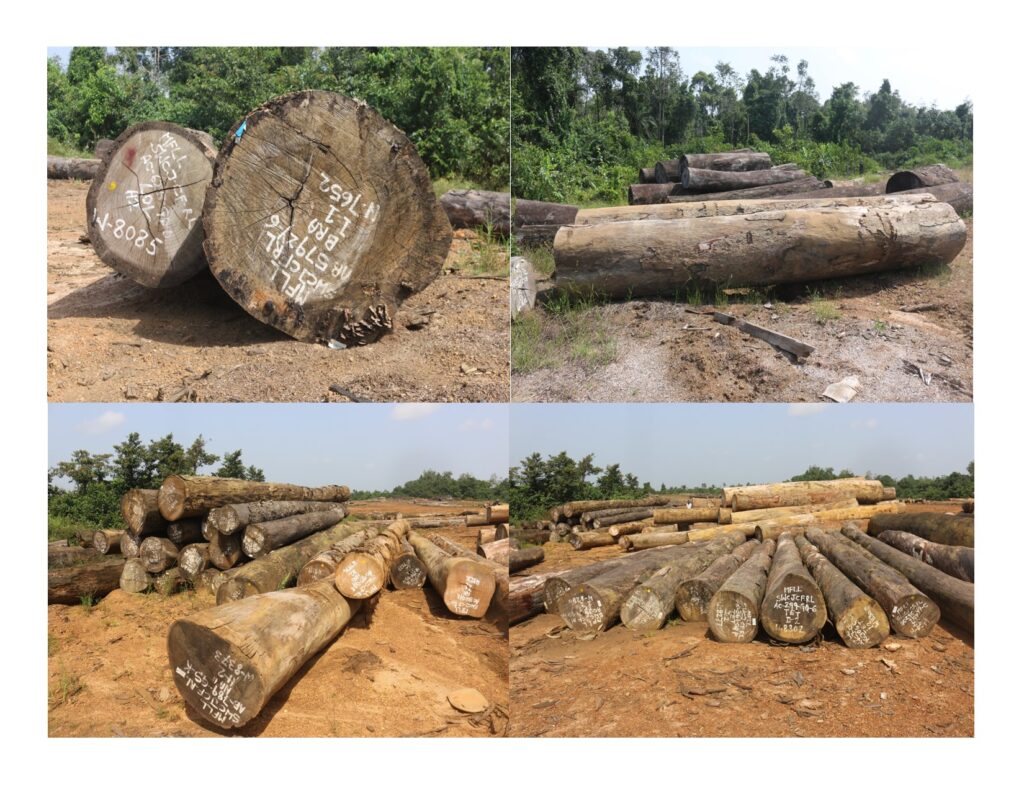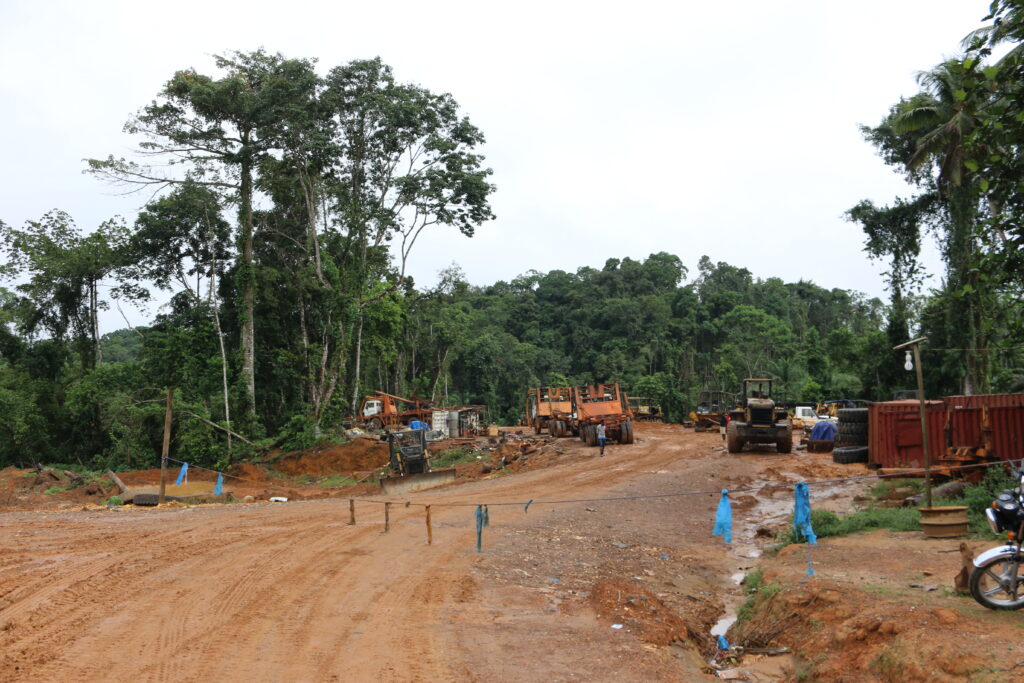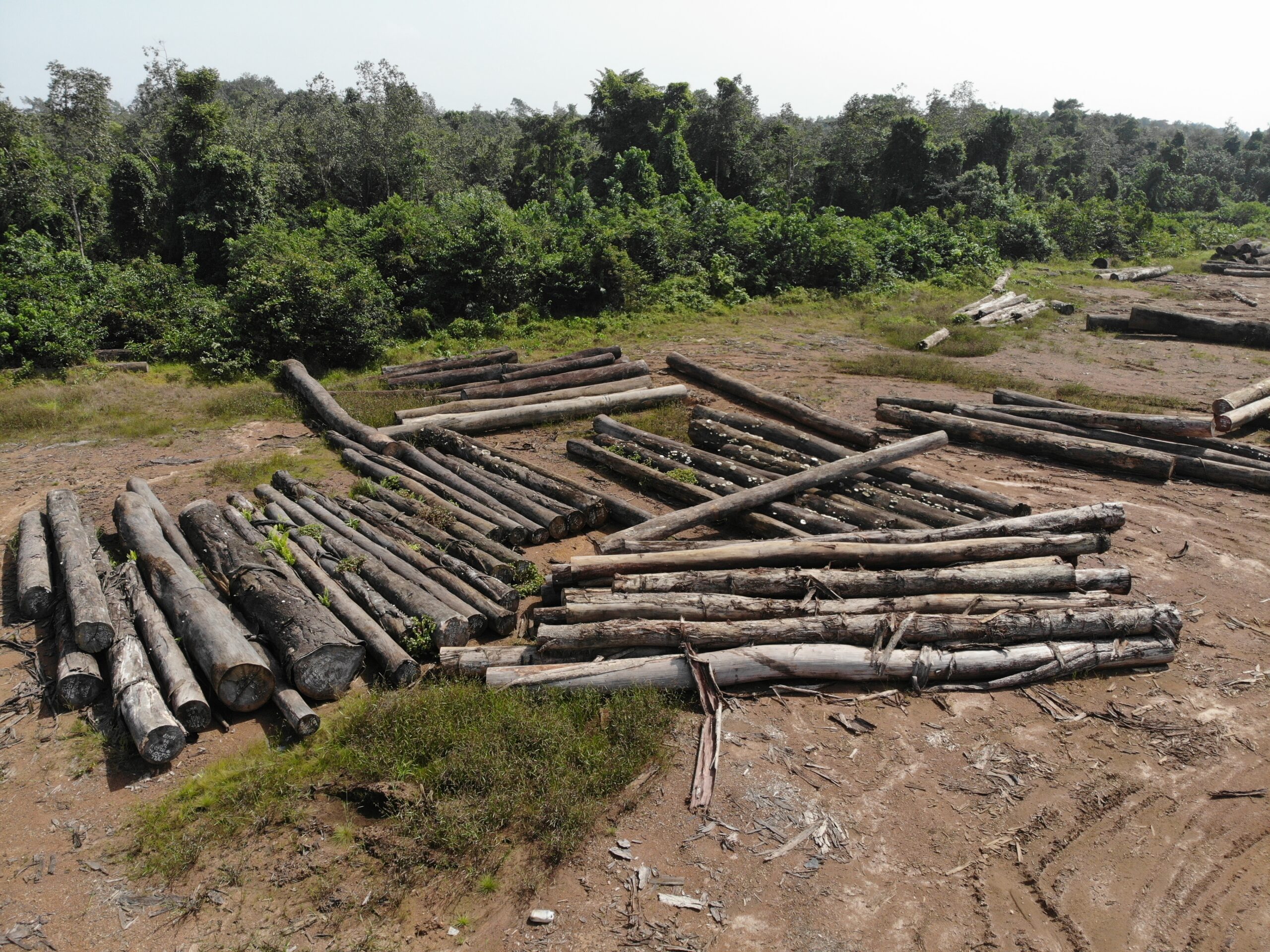Top: A drone shot of Mandra`s log yard where hundreds of abandoned logs lay bare in Greenville, Sinoe County. The DayLight/ Derrick Snyder
By Mark B. Newa
GREENVILLE, Sinoe County – Mandra Forestry Liberia, Limited, an Asian company, abandoned an estimated 7,000 logs it harvested between 2019 and 2021, according to The DayLight’s analysis of official records.
During the period, Mandra produced 6,944 logs but exported none, our analysis of records of the Forestry Development Authority (FDA) shows. Mandra harvested the logs in the Sewacajua Community Forest in Sinoe County, where it has operated since 2017.
During the 2019-2020 harvesting season, when the global timber market dipped due to the coronavirus pandemic and the U.S.-China trade war, Mandra harvested over 4,500 logs.
This journalist saw huge heaps of logs at Mandra’s log yard in Greenville in January. A good number of the wood brandishing “Sewacajua,” spread across the quiet field had already decayed. Earthmovers and timber jacks were at different positions.
Under Regulation on Abandoned Logs, Timber and Timber Products, logs should be declared abandoned when they remain at a location between 15 (three weeks) and 180 working days (about six months). By this definition, Mandra abandoned all the logs in question latest June last year.
Our calculation did not include trees Mandra cut in 2018, some parts of 2019 and last year. The Liberia Extractive Industries Transparency Initiative (LEITI) was unclear on Mandra’s production and export figures covering the period. Moreover, the FDA does not publish these records and did not grant The DayLight’s request for the information, a violation of several provisions of forestry legal frameworks. Subsequently, we obtained the information for this story from elsewhere.
Mandra’s abandoned logs are likely to be higher than 6,944. The company co-operates in two large-scale logging concessions in River Cess and Nimba Counties. The LEITI did not separate Mandra’s Sewacajua figures from the two other concessions. A 2020 investigation report by the FDA found that Mandra and its partner EJ &J Investment Corporation abandoned 65 first-class logs in River Cess.
Mandra Plantations Liberia Limited of the Virgin Islands owns Mandra’s largest shares (99.7 percent), according to its article of incorporation. Sio Kai Sing, a Malaysian, holds 0.1 percent of the shares; Tea Sin Sing, also a Malaysian, has 0.1 percent; and Tang Kwok Ben, a Hong Konger, holds the remaining 0.1 percent. It signed a 15-year agreement with the Secawajua Community Forest, covering 31,986 hectares in Sinoe’s Seekon, Pyne, Wedjah and Juarzon Districts.


Abandoned Logs Regulation
Augustine Johnson, a Liberian who serves as Mandra`s general manager, wrongly claimed that the logs in Greenville were not abandoned because they had a long lifespan and that he had already paid taxes for them.
“Before you talk about abandonment. I am expecting a ship to come to Greenville by the second week in next month to get the logs out,” Johnson told The DayLight in a phone interview.
“Apart from logs that are to be shipped, I can take logs for my own domestic use, I can take logs to saw into pieces and even bring it to Monrovia to…build my campsite. The ones that rot are used for domestic purposes,” Johnson added.
A former FDA geographic information system (GIS) technician, Johnson’s comments are not backed by facts. Payment of taxes is a requirement to obtain a log-export permit. However, taxes have nothing to do with the abandonment of logs. Rather, abandonment largely depends on the time logs stay at a particular location, according to the regulation. For instance, the woods in Mandra’s log yard in Greenville should have only stayed there for 180 days, the same as the ones Johnson said were at the Port of Greenville. Also, the FDA would have to reenter the logs in question into the FDA log-tracking system called LiberTrace.
Johnson is adamant about his wrong understanding or lack of awareness of the regulation. “The logs been there for over 30 working days doesn`t matter, or been there for I80 days it doesn`t matter. They are all Ekki logs with a huge lifespan,” Johnson said and hung up the phone. He had insisted on educating this reporter, not the other way around.
The FDA did not answer questions The DayLight sent to the agency for comment on this story. This journalist sent the email on March 30 to Managing Director Mike Doryen, copying Joseph Tally, his deputy for operations.
The regulation mandates the FDA to investigate the alleged abandonment of the logs in seven days after notification. Thereafter, it must declare the logs abandoned, petition a court to auction the wood and fine the company involved. If the company claims, it must pay administrative fees and redeem them. The FDA established the regulation in 2017 after provisions of another regulation proved not enough to prevent the waste of forest resources.
But despite years of notifications, including one from within the agency, the FDA has failed to take any legal, public actions. Last year, it said it would begin the process to auction abandoned logs during the dry season but has not done that. The situation has led to a loss of revenue for the Liberian government—and the media.
A 2020 FDA investigation found companies were abandoning logs because they were harvesting logs without first finding buyers. It also blamed irregular monitoring, lack of logistics for field officers and poor road networks for the problem.
“Logging contract holders are not doing much to minimize the incidence of abandoned logs,” the report said. “Much needed revenue… has been lost due to the unprecedented abandonment of the assorted round logs…”
The story was a production of the Community of Forest and Environmental Journalists of Liberia (CoFEJ).




